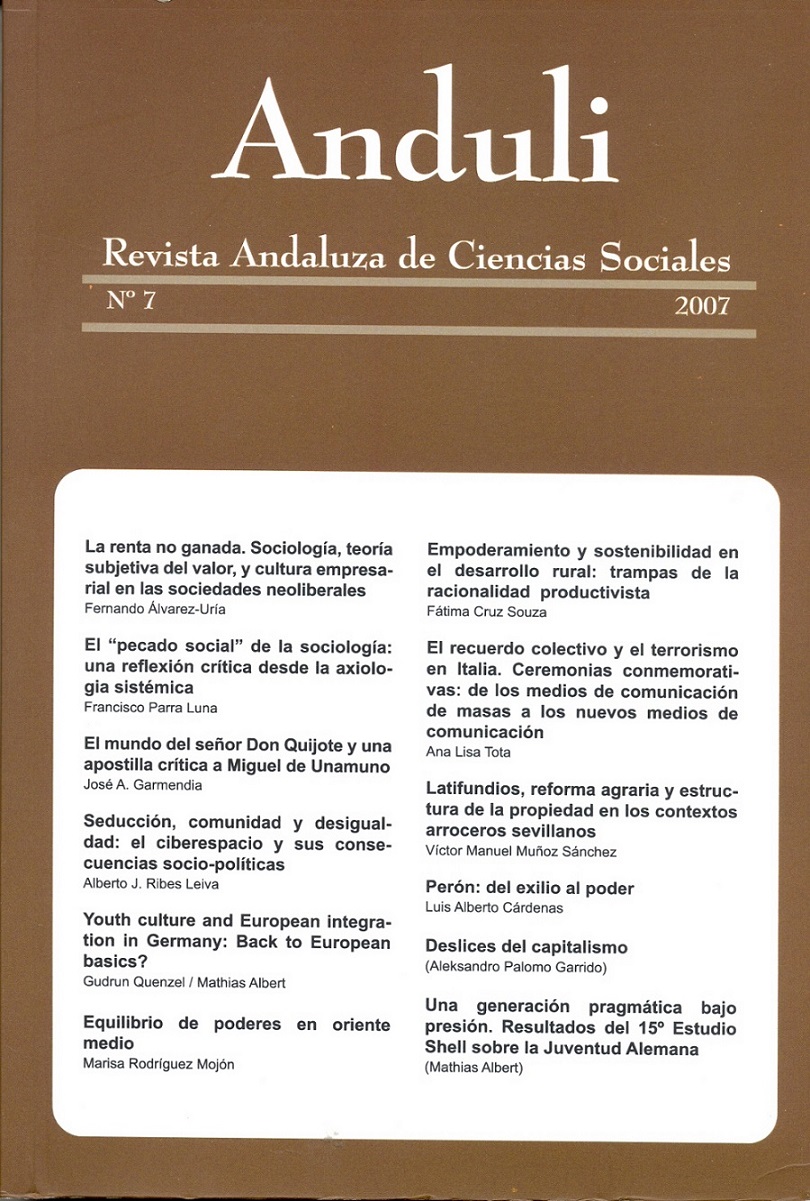LA CULTURA JUVENIL Y LA INTEGRACIÓN EUROPEA EN ALEMANIA: VOLVER A LOS BASICOS EUROPEOS?
Palabras clave:
Actitudes políticas, jóvenes alemanes, integración europeaResumen
Basándose en datos de la encuesta respresentativa sobre los jóvenes en Alemania, este artículo destaca tendencias significativas en las actitudes hacia la integracíon europea a lo largo de un periodo relativamente corto. La investigación de estas actitudes cambiantes hace pensar que estos cambios podrían señalar más que una simple reacción a corto plazo hacia acontecimientos políticos singulares una reorientación hacia la emergente conceptualización de la integracíon europea como un proyecto de paz.Descargas
Citas
Anderson, B., 1983. Imagined communities: reflections on the origin and spread of nationalism: Verso Ed.
Breakwell, G., 2004. Identity change in the context of the growing influence of European Union institutions. In R. Herrman, Th. Risse & M. Brewer, eds. Transnational identities: becoming European in the EU. Lanham et al.: Rowman & Littlefield, p. 25-39.
Castano, E., 2004. European identity: a social-psychological perspective. In R. Herrman, Th. Risse & M. Brewer, eds. Transnational identities: becoming European in the EU. Lanham et al.: Rowman & Littlefield, p. 40-58
Deutsche Shell, 2006. Jugend 2006: 15. Shell Jugendstudie. Conceptualization and co- Conceptualization and coordination by K. Hurrelmann, M. Albert & TNS Infratest Sozialforschung. Frankfurt/M.: Fischer Taschenbuch Verlag.
Diez, Th., 2004. Europe’s others and the return of geopolitics. Cambridge Review of International Affairs, 17(2), p. 319-335.
Diez, Th., Stetter, S. & Albert, M., 2008. Introduction. In Th. Diez, M. Albert & S. Stetter, eds. The European Union and border conflicts. Cambridge: Cambridge University Press. (forthcoming).
Eurobarometer 63.4, 2005. Die öffentliche Meinung in der Europäischen Union. Available at: http://ec.europa.eu/public_opinion/archives/eb/eb63/eb63_nat_de.pdf [accessed 03 May 2007].
European Youth Forum, 2007. Rome Youth Declaration. Available at: http://europa.eu/50/ docs/ro-me_youth_declaration_en.pdf [accessed 17 May 2007]
Giesen, B., 2002. Constitutional practice or community of memory: some remarks on the collecitive identity of Europe. In D. Sachsenmaier, ed. Reflections on multiple modernities. Leiden et al: Brill, p.193-216.
Hall, S., 1994. Rassismus und kulturelle Identität: ausgewählte Schriften 2. Hamburg: Argument-Verlag.
Laclau, E. & Mouffe, Ch., 1991. Hegemonie und radikale Demokratie: Zur Dekonstruktion des Marxismus. Wien: Passagen Verlag.
Lepsius, R.M., 1997. Bildet sich eine kulturelle Identität in der Europäischen Union? Blätter für deutsche und internationale Politik, 8, p. 948-955.
Manners, I., 2002. Normative power Europe: a contradiction in terms? Journal of Common Market Studies, 40(2), p.235-258.
Münkler, H., 2004. Helden wie nie. Der Tagesspiegel, 21 April.
Quenzel, G., 2005. Der Balkan im europäischen Identitätsdiskurs: zur kulturellen Legitimierung der EU-Außengrenzen. In J. Meyer, R. Kollmorgen, J. Angermüller & D. Wiemann, eds. Diskurse der Gewalt: Gewalt der Diskurse. Münster: LIT, p.127-139.
Schumann, R., 1950. Declaration of 9 May 1950. Available at: http://europa.eu/abc/ symbols/9-may/decl_en.htm [accessed 17 May 2007].
Winkler, H.A., 2004. Selbstzerstörung inbegriffen. Frankfurter Rundschau , 1 March.
Descargas
Publicado
Cómo citar
Número
Sección
Licencia
Las ediciones impresa y electrónica de esta Revista son editadas por el Editorial Universidad de Sevilla, siendo necesario citar la procedencia en cualquier reproducción parcial o total.
Salvo indicación contraria, todos los contenidos de la edición electrónica se distribuyen bajo una licencia de uso y distribución “Creative Commons Atribución-NoComercial-SinDerivar 4.0 Internacional” ![]() Puede consultar desde aquí la versión informativa y el texto legal de la licencia. Esta circunstancia ha de hacerse constar expresamente de esta forma cuando sea necesario.
Puede consultar desde aquí la versión informativa y el texto legal de la licencia. Esta circunstancia ha de hacerse constar expresamente de esta forma cuando sea necesario.
Los autores/as que publiquen en esta revista aceptan las siguientes condiciones:
- Los autores/as conservan los derechos de autor y ceden a la revista el derecho de la primera publicación, con el trabajo registrado con la licencia de atribución de Creative Commons, que permite a terceros utilizar lo publicado siempre que mencionen la autoría del trabajo y a la primera publicación en esta revista.
- Los autores/as pueden realizar otros acuerdos contractuales independientes y adicionales para la distribución no exclusiva de la versión del artículo publicado en esta revista (p. ej., incluirlo en un repositorio institucional o publicarlo en un libro) siempre que indiquen claramente que el trabajo se publicó por primera vez en esta revista.
- Se permite y recomienda a los autores/as a publicar su trabajo en Internet (por ejemplo en páginas institucionales o personales) antes y durante el proceso de revisión y publicación, ya que puede conducir a intercambios productivos y a una mayor y más rápida difusión del trabajo publicado (vea The Effect of Open Access).





